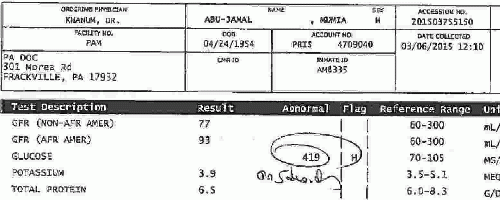Systematic, pay for performance reform needed to bring
healthcare in correctional facilities up to humane standards
This is the final part of a series on Mumia Abu-Jamal's fight for acceptable
health care for himself and for over 2 million inmates across the country.
(Click here for Part I, here for Part II, or here for Part IIIa)
In Abu-Jamal's case, most of the legal and media discussion has focused on the denial of hepatitis treatment to him and inmates across the country. And while that alone is malpractice, what is even more appalling was the failure to treat his diabetes. Diabetes care is a cornerstone of basic healthcare. Abu-Jamal's case illustrates that inmates are denied not only expensive medical treatments but also widely available, inexpensive treatments. Moreover, it demonstrates a failure of correctional healthcare systems to provide even the most basic health care for its patients.
Abu-Jamal tested positive for diabetes while imprisoned, and yet it was intentionally left untreated. In his medical records, blood tests taken on March 8, 2015 showed a glucose level of 419, well exceeding the diabetic level of 200.
There are two major forms of Diabetes. Type 1 Diabetes is the kind that frequently presents young in life. While it is very common for this form of diabetes to be initially diagnosed in a crisis setting (coma, severe dehydration, electrolyte disturbances), Type 2 Diabetes, the form that typically starts in adulthood and the form that Abu-Jamal has, very rarely gets to that point because it develops more slowly and is caught early before it ever reaches that level of severity.

Lab results from Abu-Jamal's medical record
(Image by courtesy of Abu-Jamal's legal team) Details DMCA
In his chart, someone circled the blood sugar value and wrote by it "on steroids." What this note suggests is that the provider felt that since there was an explanation for his high blood sugar, there was no need to treat it. That lack of action is equivalent to looking at a patient whose pneumonia is so severe that they need a breathing machine and then saying, "We know why they're not breathing well. They have pneumonia." Just because you know the cause of a finding doesn't mean it doesn't have to be treated.
Standard of care for a blood sugar that high is to immediately give medication to lower it, or at least monitor three times a day. One of the main medications for the treatment of diabetes is metformin. It costs $4 a month. But because he didn't get any treatment, his sugars climbed to levels so toxic that his brain stopped functioning and he went into a diabetic coma.
Countrywide epidemic of neglectful healthcare
Sadly, Abu-Jamal's
healthcare is not an exception. It's an example of the poor healthcare that is
rampant in prisons and jails across the country. Examples of the felonious
level of healthcare are so numerous that they are impossible to list in their
entirety. However a few examples illustrate the severity of the negligence.
Anthony Carvajal, a Florida inmate, needed treatment for cancer, but instead was given
ibuprofen for six months. An inmate in California was denied cardiac medications after being discharged from the
hospital for heart failure. Ieasha Meyers, an inmate in Iowa, was forced to give birth without medical personnel on the floor
of her cell when her
reports of contractions went ignored.
The situation in jails is even more deplorable. Because jails are seen as temporary holding institutions, the quality of healthcare falls short of even that of prisons. The justification for this is that the average length of stay in jails is less than 30 days so only minimal healthcare services are needed. However, because of prison over-crowding, inmates can reside there much longer. Dr. Smith (named changed out of fear of retaliation) is a physician who worked for Advanced Correctional Health Care, a private company that provided services for a network of jails. According to her experience, she saw inmates that were there for over 7 months on a regular basis.
Dr. Smith recalls struggling daily to provide basic the medical care that she knew the inmates deserved. Whether she was requesting a procedure as simple as a dental extraction, attempting to secure a needed medication, or trying to order indicated blood tests, she always came up against the same mantra, "The bottom line of what they said is that you just want to keep people alive. You don't actually need to treat anything unless to prevent a deterioration of their health."
The facilities and lack of access horrified her. She provided care for four different jails and opportunities for inmates to see her were extremely limited. She would provide access to patients for 1 or 2 hours once or twice a week at most at each location. Given that most patient visits last 15-20 minutes, at maximum she would see only 8 patients a day. One facility only had her come only once every two weeks. Inmates were required to request appointments, and if there wasn't enough space, they just didn't get to see the doctor.
Dr. Smith recalls a case where she was called in the middle of the night for a medical emergency. A woman who was 8 months pregnant was being held for failing to appear in court for a minor offense. While there she developed acute abdominal pain that Dr. Smith realized she needed hospital care to treat. She was worried it could be fatal to both the inmate and her fetus.
By the time the guards had called Dr. Smith the woman had been suffering for four hours and her pain was getting worse. When she asked why it had taken the guards so long to contact her, they responded that they thought that the inmate was just whining. Though Dr. Smith insisted that they call an ambulance immediately, as precious time had already been lost, it took them several more hours to transport the patient because they required that she first complete all the paperwork to be "released on her own recognizance." According to Dr. Smith, this was routine. By doing this, the medical bills would be charged to the patient rather than the jail.
Unfortunately, Advanced Correctional Health Care is no different than most of the other companies in this industry. The four largest companies in corrections healthcare are Corizon Healthcare, Correct Care Solutions, MHM Correctional Services, and Wexford Health Services. Together, the top four companies are responsible for the healthcare of nearly half of the incarcerated population in the United States. Just as in prisons, the examples and lawsuits over egregiously poor healthcare in jails are too numerous to catalog in their entirety, but a few examples demonstrate the atrocities.
(Note: You can view every article as one long page if you sign up as an Advocate Member, or higher).





